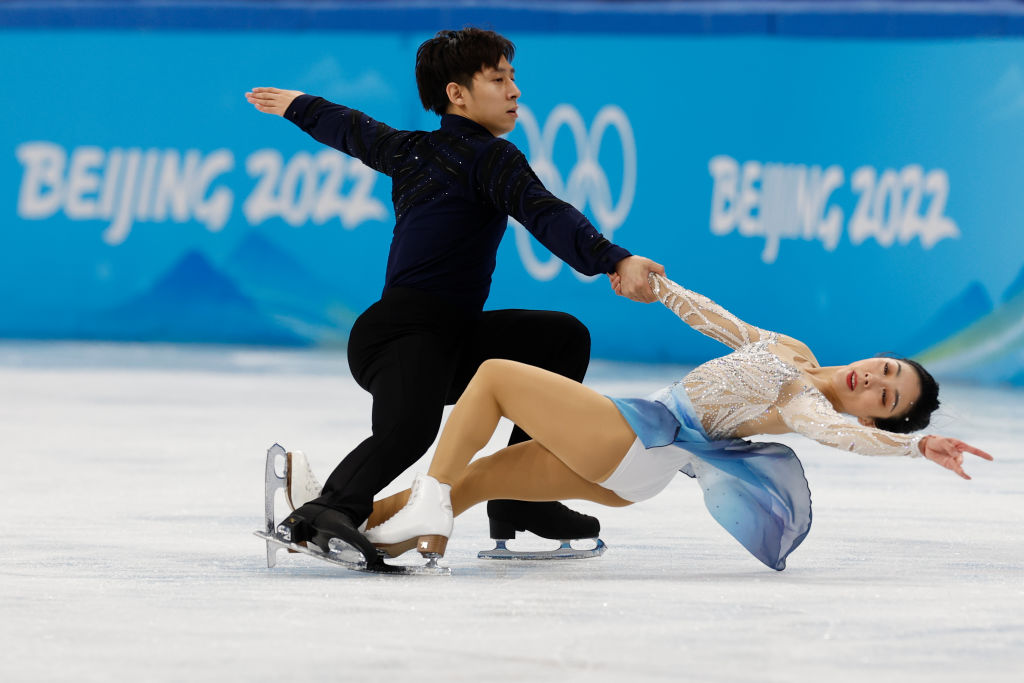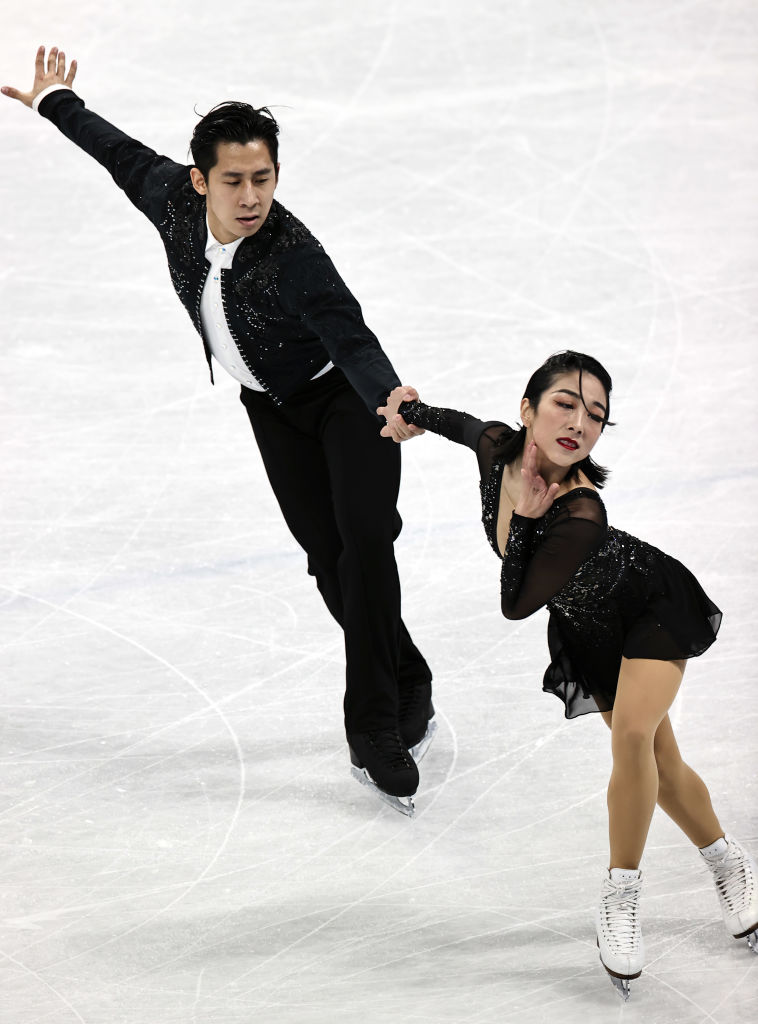Pairs teams closed out the dramatic and controversial figure skating competition at the Beijing Olympics on Feb. 19. Sixteen teams took to the ice, and for the second time, China earned gold.
The win represents a huge boost for the Chinese pairs skating program, which has been building over the past two decades to challenge Russian dominance in the discipline. The Chinese pair of Sui Wenjing and Han Cong, the reigning Olympic silver medalists, skated a nearly flawless program to edge past three Russian teams for gold.
Evgenia Tarasova and Vladimir Morozov of the Russian Olympic Committee (ROC) earned silver, though perhaps attracting more attention for their coaching team, which includes Eteri Tutberidze, at the center of a doping violation involving one of her women’s skaters, 15-year-old Kamila Valieva, who was favored to win gold but ended up off the podium in fourth. The scandal continues to shadow the skating events; the medals for the team event, which the ROC athletes won, with the U.S. earning silver and Japan bronze, are delayed until the full investigation into the case, which could take months, is concluded. “They should have a ceremony for the clean athletes that delivered,” U.S. pairs skater Alexa Knierim, who competed as part of the U.S. team, said. “They deserve that moment.”
Read more: Olympic Women’s Figure Skating Concludes With Yet Another Shocker
The ROC’s Anastasia Mishina and Aleksandr Galliamov earned bronze and continued the long tradition of Olympic medalists trained by legendary pairs coach Tamara Moskvina.
China’s journey to a figure skating pairs powerhouse
Over the last couple of decades, that Russian grip on the pairs figure skating podium has been loosening, pried open by talented coaches and skaters from China and Japan as well as the West. Japan’s Riku Miura and Ryuichi Kihara finished in seventh, after earning medals at two Grand Prix events this season while training with Canadian pairs coach Bruno Marcotte and Meagan Duhamel; Marcotte coached Duhamel and her partner to bronze in 2018.
China in particular has been building momentum as a pairs figure skating powerhouse, after Shen Xue and Zhao Hongbo earned the country’s first Olympic medal, a bronze, in the 2002 Salt Lake City Olympics that was shadowed by the judging controversy in the pairs event. The couple repeated the bronze in 2006, and in 2010 finally earned their long-sought gold and made history again as the first Chinese skaters to become Olympic champions in any discipline in figure skating. Their win broke a 46-year streak of Russian pairs champions, beginning with Ludmilla and Oleg Protopopov.

The win by Sui and Han is especially poignant for Shen and Zhao, not only because it occurred in their home country, but also because of the venue. In 2007, Shen and Zhao married in Capital Indoor Stadium; their “Wedding on Ice” was part of the country’s first Artistry on Ice festival to promote figure skating, which was attended by 20,000 fans. Sui said she began skating after watching Zhao, her skating idol, win China’s first gold in skating.
After retiring in 2010, Shen and Zhao dedicated themselves to building the sport in their country and joined their coach Yao Bin to strengthen training programs in Zhao’s hometown of Harbin. Shen is now president of the Chinese Figure Skating Association, while Zhao is the head coach of China’s national figure skating team.
Sui and Han’s gold-medal performances
In skating to gold, Sui and Han set a record in the short program, with a sharp, passionate tango that included a textbook throw triple twist in which Sui twirled three times above Han’s head. The height they achieved earned them high execution points as well, which set them apart from the field. For years, Chinese pairs have relied on their acrobatic and jumping skills to rack up enough points to reach World Championship and Olympic podiums. But Sui and Han in particular represent an evolution of that strategy for the Chinese; their short and free programs reflect a deeper dedication to the presentation and interpretive elements of skating. In their short program, for example, which they skated to Mission Impossible 2’s “Orchestra Suite,” with its tango and flamenco themes, Sui added a sassy touch with a strand of hair that she theatrically tossed in front of and off her face at key moments in the routine. “It was my special design,” she said. “I intended to let it fall down, and I thought that would make me look cool. And after that, I put it back by a head shake, which I thought would make it more special.” A seemingly trivial detail, but it reflects a better understanding of the passion and attitude of the music, something that can make a difference when all the skaters are competing at the highest technical level.

Read more: The Russian School at the Center of the Controversial Beijing Olympics Women’s Figure Skating Event
They continued that approach with their free program, set to “Bridge Over Troubled Water,” which was created by renowned choreographer and coach Lori Nichol. The choice signals an embrace of a more contemporary and creative approach to skating, even as they continued to push the technical boundaries. They were the only pairs team to perform a quadruple twist, and Sui’s lighting fast twirls and rafter-reaching height earned them 10.42 points, the highest technical score for an element of the entire pairs competition. Sui admitted it was a calculated skill that they discussed with Zhao to set them apart from their competitors. “We’ve been thinking about the quadruple twist for a long time, every since Pyeongchang,” said Sui. “We thought with the quadruple twist we can get more [points]; it’s our killer move. After all, the Olympic spirit is faster, higher, stronger so for us … we wanted to showcase our best program and always want to pursue the highest level of the Olympic spirit.”
While Sui stumbled on their side-by-side triple Salchow jumps, which the judges downgraded, their entries into lifts, and Sui’s positions in the air push the boundaries of the sport and stood out from the more traditional positions the Russians took. The judges rewarded the Chinese pair with generous program components scores that started at 9.5 out of 10 points.
For the pair, getting to the Olympics wasn’t always a given. Both have faced injuries and multiple surgeries; Sui on both ankles, which required lengthy recovery times during which she had to learn how to walk, not to mention skate, again. Han had hip surgery last year, and missed the beginning part of the Olympic season. The decided to return to “Bridge Over Troubled Water,” which they first used in 2017, because the song holds a deep personal significance for them. They connected with its message of needing to find ways to ford difficult times and bridge life’s inevitable challenges. Finally feeling relief from those ups and downs, the doubts and the questions, as well as the pressure of entering the event as gold medal favorites in their home country, Sui broke down in tears at the end of the program. The gold is as much validation for Zhao’s leadership, and his efforts to encourage young athletes to pick up skating. “He is my hero, he is the reason why I wanted to join this sport,” Sui said. “He has been supporting us, preparing us mentally, physically and technically.” Added Han: “This [gold medal] is indeed a legacy from [Shen and Zhao].”
Zhao liberally shares his experience as a four-time Olympian with the skaters he coaches; “Our coach is an experienced athlete; he imparted his unique understandings and lessons to us. In regular training, we can also adjust our psychological status [since] he gives us a lot of support and encouragement,” Jin Yang, who finished fifth with his partner Cheng Peng said of Zhao.
Peng and Yang represent the continued bright future China has in pairs. Although they finished off the podium, their fifth-place standing is a huge improvement over their 17th place finish at the 2018 Games. They finished fifth at the last World Championships and finished on the podium at Grand Prix events in the past year, which prepares them well for a continued climb up the world rankings. They will likely continue the country’s strong showing; Chinese pairs have made it to the podium at every Olympics except 2014 since Shen and Zhao earned their first bronze in 2002.
And there will be more young skaters behind them, if Shen and Zhao have their way. Their program to encourage young children to pick up skating has already attracted millions of future skaters. “More and more kids are getting on the rink, getting into their skate shoes, just like me back then,” said Sui. “I think this is a really good heritage, passing on the torch. This is the second gold medal in pairs skating for China, and it won’t be the last one. We will continue to work hard to win more gold medals and create more miracles in figure skating in China.”
Read more: Quadruple Jumps Are Transforming Women’s Figure Skating. Surya Bonaly Tried to Do It 30 Years Ago
The Americans also skated well, with Alexa Knierim and Brandon Frazier finishing sixth and Ashley Cain-Gribble and Timothy Leduc ranking eighth. Knierim and Frazier’s placement was the highest finish for a U.S. pairs team since the 2006 Olympics. Leduc also made history as the first non-binary athlete to compete at the Olympics. Dressed in matching unitards, the team wanted their presence at the Games to open doors for a greater diversity of athletes.
More Must-Reads from TIME
- Donald Trump Is TIME's 2024 Person of the Year
- Why We Chose Trump as Person of the Year
- Is Intermittent Fasting Good or Bad for You?
- The 100 Must-Read Books of 2024
- The 20 Best Christmas TV Episodes
- Column: If Optimism Feels Ridiculous Now, Try Hope
- The Future of Climate Action Is Trade Policy
- Merle Bombardieri Is Helping People Make the Baby Decision
Contact us at letters@time.com